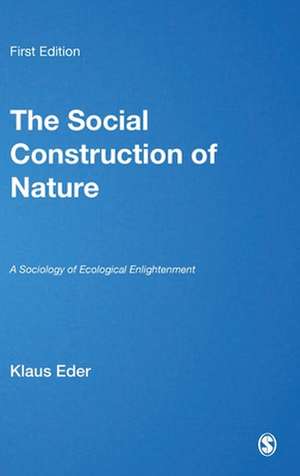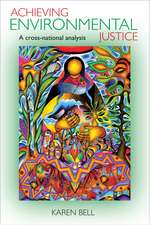The Social Construction of Nature: A Sociology of Ecological Enlightenment: Published in association with Theory, Culture & Society
Autor Klaus Ederen Limba Engleză Hardback – 27 aug 1996
Eder concludes with an examination of the symbolic order of society and of the role of religion in modern culture. Using a culturalist interpretation, he explains how environmentalism, and the social construction of nature, is a key index of social order and structure.
Toate formatele și edițiile
| Toate formatele și edițiile | Preț | Express |
|---|---|---|
| Paperback (1) | 480.44 lei 43-57 zile | |
| SAGE Publications – 19 aug 1996 | 480.44 lei 43-57 zile | |
| Hardback (1) | 1493.09 lei 43-57 zile | |
| SAGE Publications – 27 aug 1996 | 1493.09 lei 43-57 zile |
Din seria Published in association with Theory, Culture & Society
-
 Preț: 189.83 lei
Preț: 189.83 lei -
 Preț: 444.21 lei
Preț: 444.21 lei -
 Preț: 443.02 lei
Preț: 443.02 lei -
 Preț: 393.44 lei
Preț: 393.44 lei -
 Preț: 280.42 lei
Preț: 280.42 lei -
 Preț: 443.94 lei
Preț: 443.94 lei -
 Preț: 392.73 lei
Preț: 392.73 lei - 8%
 Preț: 445.19 lei
Preț: 445.19 lei -
 Preț: 307.51 lei
Preț: 307.51 lei -
 Preț: 426.59 lei
Preț: 426.59 lei - 22%
 Preț: 372.33 lei
Preț: 372.33 lei -
 Preț: 394.44 lei
Preț: 394.44 lei - 18%
 Preț: 1491.48 lei
Preț: 1491.48 lei - 15%
 Preț: 480.56 lei
Preț: 480.56 lei - 15%
 Preț: 475.52 lei
Preț: 475.52 lei - 15%
 Preț: 486.73 lei
Preț: 486.73 lei - 18%
 Preț: 1364.13 lei
Preț: 1364.13 lei - 18%
 Preț: 1536.08 lei
Preț: 1536.08 lei - 18%
 Preț: 1491.65 lei
Preț: 1491.65 lei - 15%
 Preț: 487.56 lei
Preț: 487.56 lei - 15%
 Preț: 479.46 lei
Preț: 479.46 lei - 15%
 Preț: 479.78 lei
Preț: 479.78 lei - 15%
 Preț: 431.90 lei
Preț: 431.90 lei - 15%
 Preț: 487.05 lei
Preț: 487.05 lei - 18%
 Preț: 1229.47 lei
Preț: 1229.47 lei - 26%
 Preț: 926.68 lei
Preț: 926.68 lei - 18%
 Preț: 1234.14 lei
Preț: 1234.14 lei - 15%
 Preț: 480.44 lei
Preț: 480.44 lei -
 Preț: 479.85 lei
Preț: 479.85 lei - 15%
 Preț: 479.27 lei
Preț: 479.27 lei - 18%
 Preț: 1203.04 lei
Preț: 1203.04 lei - 15%
 Preț: 479.13 lei
Preț: 479.13 lei - 18%
 Preț: 1126.63 lei
Preț: 1126.63 lei - 18%
 Preț: 1234.14 lei
Preț: 1234.14 lei - 15%
 Preț: 478.44 lei
Preț: 478.44 lei - 15%
 Preț: 478.12 lei
Preț: 478.12 lei - 15%
 Preț: 448.04 lei
Preț: 448.04 lei - 18%
 Preț: 1321.90 lei
Preț: 1321.90 lei - 18%
 Preț: 1180.15 lei
Preț: 1180.15 lei - 19%
 Preț: 419.04 lei
Preț: 419.04 lei - 18%
 Preț: 886.71 lei
Preț: 886.71 lei - 18%
 Preț: 1182.37 lei
Preț: 1182.37 lei - 18%
 Preț: 1321.58 lei
Preț: 1321.58 lei - 18%
 Preț: 1074.21 lei
Preț: 1074.21 lei - 15%
 Preț: 428.79 lei
Preț: 428.79 lei -
 Preț: 482.14 lei
Preț: 482.14 lei - 15%
 Preț: 466.03 lei
Preț: 466.03 lei - 18%
 Preț: 1141.40 lei
Preț: 1141.40 lei -
 Preț: 477.89 lei
Preț: 477.89 lei
Preț: 1493.09 lei
Preț vechi: 1820.84 lei
-18% Nou
Puncte Express: 2240
Preț estimativ în valută:
285.74€ • 297.21$ • 235.89£
285.74€ • 297.21$ • 235.89£
Carte tipărită la comandă
Livrare economică 14-28 aprilie
Preluare comenzi: 021 569.72.76
Specificații
ISBN-13: 9780803978485
ISBN-10: 0803978480
Pagini: 256
Dimensiuni: 156 x 234 mm
Greutate: 0.53 kg
Ediția:First Edition
Editura: SAGE Publications
Colecția Sage Publications Ltd
Seria Published in association with Theory, Culture & Society
Locul publicării:London, United Kingdom
ISBN-10: 0803978480
Pagini: 256
Dimensiuni: 156 x 234 mm
Greutate: 0.53 kg
Ediția:First Edition
Editura: SAGE Publications
Colecția Sage Publications Ltd
Seria Published in association with Theory, Culture & Society
Locul publicării:London, United Kingdom
Recenzii
`Klaus Eder affords us with a rare, genuinely social consructionist perspective on nature. He must be credited, and his book praised, on numerous grounds. First and foremost, he retrieves, develops and introduces to a German and Anglo-Saxon readership what is probably to this day the most comprehensive and thoroughly social constructionist framework to apprehend human/nature relationships. The author also provides a sound account of food taboos across different cultures, including our own, thereby acting as a precursor to what is known as `symmetrical anthropology' This book is an important contribution to the social sciences in general' - British Journal of Sociology
`The Social Construction of Nature argues that modernity's characteristic pride in dominating nature has caused us to forget that we live in a culture which forces us into a self-destructive relationship with nature. The author shows how this is reflected in our eating practices: carnivorous culture is seen as an extension of domination going back to Greek roots, while the emerging vegetarian culture is based on the idea of harmony with nature. In this context the opposite of the natural foods movements is the industrial exploitation of nature. The final part claims that contemporary environmentalism is a turning point in the cultural evolution of modernity' - Scientific and Medical Network Journal
`The Social Construction of Nature argues that modernity's characteristic pride in dominating nature has caused us to forget that we live in a culture which forces us into a self-destructive relationship with nature. The author shows how this is reflected in our eating practices: carnivorous culture is seen as an extension of domination going back to Greek roots, while the emerging vegetarian culture is based on the idea of harmony with nature. In this context the opposite of the natural foods movements is the industrial exploitation of nature. The final part claims that contemporary environmentalism is a turning point in the cultural evolution of modernity' - Scientific and Medical Network Journal
Cuprins
Introduction
PART ONE: A SOCIAL THEORY OF NATURE
The Theoretical Construction of Nature
A Critique of Naturalistic Theories of Evolution
The Evolution of the Societal Relationship to Nature as a Learning Process?
An Ecological Critique of Practical Reason
PART TWO: FROM NATURE TO CULTURE
Culinary Morality
A Comparative Analysis of Food Taboos
Carnivorous and Vegetarian Culture
Two Models of the Symbolic Organization of Society
The Modern Discourse on What To Eat
A Sociology of the Natural Foods Movement
PART THREE: THE MODERN POLITICS OF NATURE
Framing and Communicating Nature
The Political Transformation of Modern Environmentalism
The Politics of Nature
A New Politics?
PART ONE: A SOCIAL THEORY OF NATURE
The Theoretical Construction of Nature
A Critique of Naturalistic Theories of Evolution
The Evolution of the Societal Relationship to Nature as a Learning Process?
An Ecological Critique of Practical Reason
PART TWO: FROM NATURE TO CULTURE
Culinary Morality
A Comparative Analysis of Food Taboos
Carnivorous and Vegetarian Culture
Two Models of the Symbolic Organization of Society
The Modern Discourse on What To Eat
A Sociology of the Natural Foods Movement
PART THREE: THE MODERN POLITICS OF NATURE
Framing and Communicating Nature
The Political Transformation of Modern Environmentalism
The Politics of Nature
A New Politics?
Notă biografică
Descriere
This book is a unique and agenda-setting interpretation of nature and ecology.













